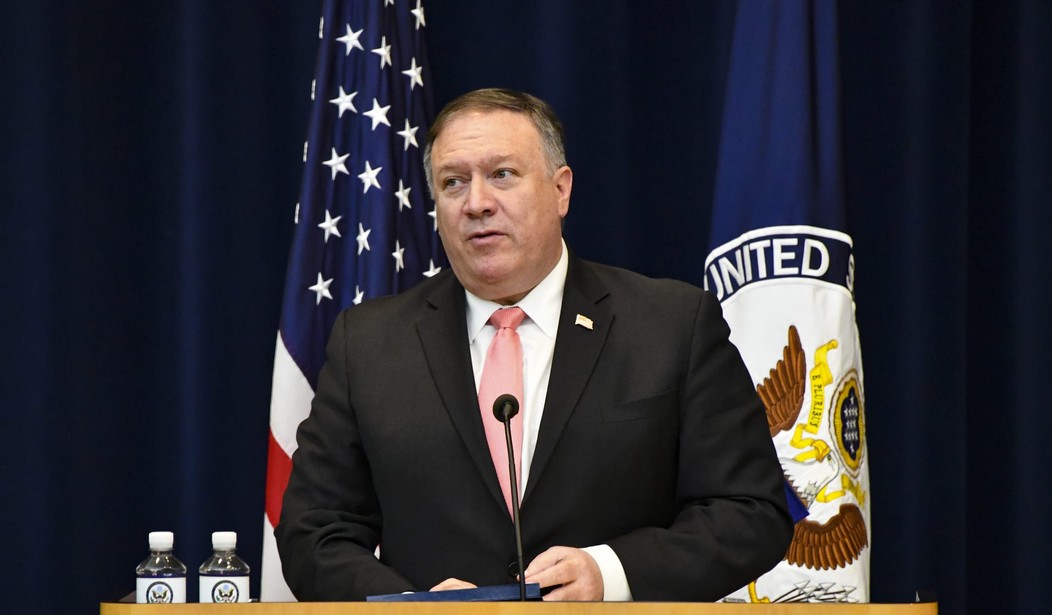WASHINGTON — Secretary of State Mike Pompeo said this morning that snapback sanctions on Iran will be “just a part of the U.S. government’s total effort to change the behavior of the Ayatollah Khamenei” and the regime in Tehran.
Sanctions on Iran’s energy, shipbuilding, shipping and banking sectors that were lifted as a result of the P5+1 nuclear deal will go back into effect Monday, Pompeo told reporters on a call.
Eight countries, though, are receiving waivers that will allow them to keep buying oil from Iran without coming under U.S. sanctions: Pompeo did not identify the countries, but Bloomberg reported that four are Japan, India, China and South Korea.
“We expect to issue some temporary allotments to eight jurisdictions, but only because they have demonstrated significant reductions in their crude oil and cooperation on many other fronts and have made important moves towards getting to zero crude oil importation. These negotiations are still ongoing,” Pompeo said. “Two of the jurisdictions will completely end imports as part of their agreements. The other six will import at greatly reduced levels.”
He stressed that “our actions today are targeted at the regime, not the people of Iran who have suffered grievously under this regime”; the U.S. “will maintain many humanitarian exemptions to our sanctions, including food, agriculture commodities, medicine and medical devices.”
Treasury Secretary Steve Mnuchin said the U.S. has “gone after the financial networks that the Iranian regime uses to fuel its terrorist proxies in Hezbollah and Hamas, to fund the Houthis in Yemen, and to support the brutal Assad regime in Syria.”
On Monday, Treasury will add more than 700 names to the list of blocked entities, he said, which includes “hundreds of targets previously granted sanctions relief under the JCPOA, as well as more than 300 new designations.”
Senate Republicans including Ted Cruz (R-Texas), Tom Cotton (R-Ark.) and Marco Rubio (R-Fla.) want the administration to cut off Iranian banks from conducting global transactions using the Society for Worldwide Interbank Financial Telecommunication, and are expected to introduced legislation to force President Trump’s hand after the election.
Mnuchin said today that SWIFT “would be subject to U.S. sanctions if it provides financial messaging services to certain designated Iranian financial institutions” and that the U.S. “advised SWIFT that it must disconnect any Iranian financial institution that we designate as soon as technologically feasible to avoid sanctions exposure.”
“Just as was done before, humanitarian transactions to non-designated entities will be allowed to use the SWIFT messaging system as they have done before, but banks must be very careful that these are not disguised transactions, or they could be subject to certain sanctions,” he added.
Pompeo brushed off European Union efforts to keep the Iran nuclear deal alive, noting “there has been an enormous departure of European businesses” since the U.S. announced it would withdraw from the 2015 agreement.
“Whatever it may be that the EU is proposing, the folks who have risk — financial risk, business risk, operational risk — have already made their decision about the effectiveness of the sanctions that will be reimposed this coming week,” he said.
Pompeo said the U.S. strategy is “counting on the Iranian people to have the opportunity, and we are working towards allowing the Iranian people to have the opportunity to have the government they want, a government that doesn’t take wealth from their country and spend it on malign activity around the world.”
He promised to deliver Monday “a complete explanation of what we’re going to do in the continued efforts to prevent” Iran’s nuclear facilities “from doing the things that put the world at risk through proliferation.”









Join the conversation as a VIP Member